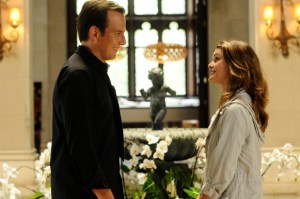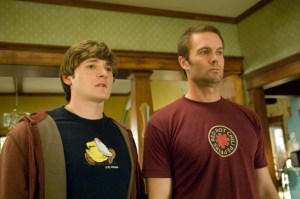
FOX
Say you create a sitcom that you’re really proud of. You like it, critics like it, it develops a loyal fan base. It has its run and goes off the air, maybe sooner than you’d have liked, sooner than your fans would have liked, before you’ve had a chance to really tell all the stories you’d have liked to tell.
What do you do? You can (1) try to revive the show, on another network or as a movie, (2) shrug, move on and create something different or (3) create a new show that doubles as a crypto do-over of the work you never quite got to finish.
Running Wilde and Raising Hope, both debuting on Fox tonight, each more or less choose option (3)—unfortunately.
Wilde comes from creator Mitchell Hurwitz, of Arrested Development, and Will Arnett, of Arrested Development. It’s about an emotionally stunted, entitled rich character and the well-intentioned do-gooder who comes back into his life, which you will recognize as essentially the premise and theme of Arrested Development. Except in this case, Gob is the lead character and the well-meaning Michael Bluth type is not his brother but his love interest.
Arnett plays spoiled playboy Steve Wilde, the heir to an oil fortune, who is surrounded by eccentric retainers and has never had to work. His life is upturned when he comes back into contact with childhood sweetheart Emmy Kadubic (Keri Russell), an environmentalist attempting to save a rainforest tribe whose home Wilde’s company is on the verge of destroying. Wilde offers to let Emmy use his address to get her daughter Puddle (the show’s narrator) into a fancy local school; really, he wants to make Emmy love him, even if it means trying, or pretending, to be a good person.
The original pilot had funny moments, but also some pacing problems and dead spots—which the final version, unfortunately, if anything made worse. (Among the casting changes: David Cross as Emmy’s eco-terrorist boyfriend, playing a clueless eccentric with a love interest who’s slipping away from him—not unlike his role on Arrested Development.) And a second episode that Fox just sent out is no more encouraging.
I’ve heard the theory that Wilde simply can’t work because a character like Gob/Wilde can’t be the center of an engaging comedy. I disagree; I think any character can be the center of anything if the idea is executed right. In theory, the idea of a screwball romantic comedy in which a man-child is forced to grow up could be very good. But this particular show is too forced in its plot and its supporting characters too broadly drawn. (Wilde’s retinue of servants are not necessarily any weirder than the Bluth family, but without the history and entanglements of blood ties, there’s nothing to make their connection to the man who signs their paychecks interesting.) It still has the elements of wordplay and farce that make me eager to see more from Hurwitz, but I have a feeling that “more” here means “his next project after Running Wilde.”

FOX
Raising Hope, meanwhile, is not quite as directly similar to creator Greg Garcia’s last show, My Name Is Earl, but it’s close enough: a sweet screw-up from a family of working-class eccentrics is suddenly forced to change his life and try to get right. Here, young pool cleaner Jimmy Chance (Lucas Neff) discovers he has a baby from a one-night stand with a woman on death row. After she gets the chair, he decides to raise the baby (Princess Beyoncé, to be renamed, yes, Hope, because the Chance family does like its allegorical names), with help from his tough-talking mom (Martha Plimpton) and immature dad (Garret Dillahunt)—as well as with not-so-much-help from his addled grandmother (Cloris Leachman).
Besides having a similar setting and title to Raising Arizona, Hope shares with Earl a story of a dopey, well-meaning loser seeking to reform himself. But its supporting cast and jokes skew more crass and mean-spirited (“I just threw up on the baby” is one punchline, while at one point senile grandma makes out with Jimmy, just to remind you you are watching An Official Fox Dysfunctional Family Sitcom).
Yet there are at least the slivers of promise that the show could get better. Neff is amiably charming, Dillahunt and Plimpton give their characters a realism that belies the pilot’s often-contemptuous jokes, and maybe 20% of the first episode shows a sweet-heartedness that rises above the easy white-trash humor. If the scripts could remember what the performances are trying to tell us—that the Chance family are actual people, if not the brightest ones—this show might, like Jimmy, reach down and find something better in itself. It’s a small Hope, but it’s better than nothing.


